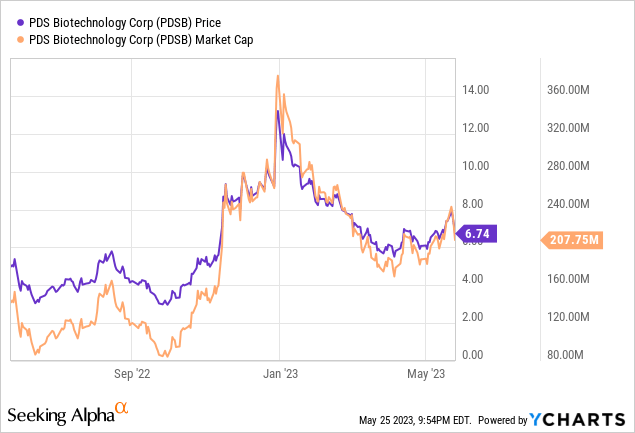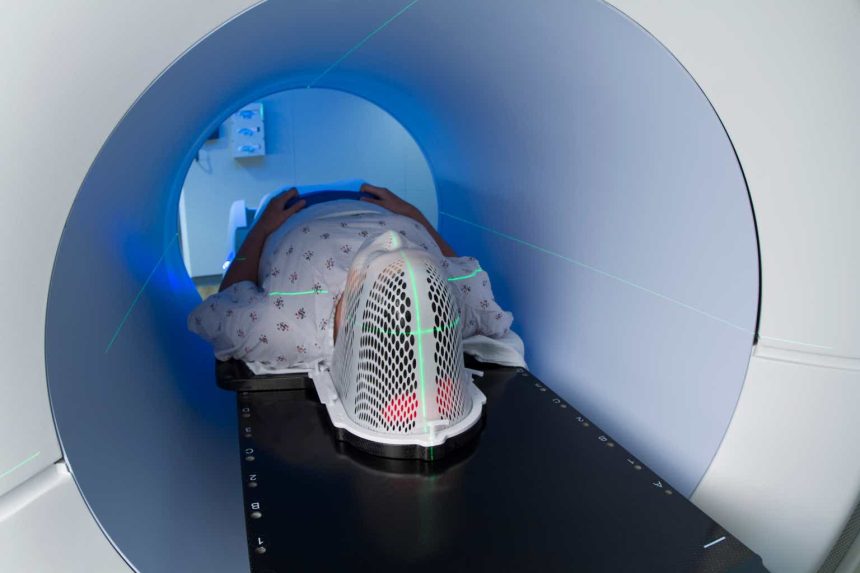Introduction
PDS Biotechnology (NASDAQ:PDSB), or “PDS Biotech”, develops immunotherapies for targeted cancers and infectious diseases using proprietary technologies like Versamune and Infectimune. These therapies stimulate the production of CD4 helper and CD8 killer T cells, potentially surpassing the efficacy of existing immunotherapies. The company’s pipeline targets a range of cancers, including HPV-positive and prevalent types, and designs vaccines capable of durable immune responses, making them potentially applicable for universal influenza vaccinations.
In my previous analysis, I highlighted the potential of PDS Biotech and their innovative immunotherapy, PDS0101, in treating HPV-positive cancers. The preliminary results from their Phase 2 trial were encouraging, demonstrating enhanced treatment efficacy and a favorable safety profile. However, I advised caution and suggested waiting for the trial’s completion before drawing definitive conclusions. It was important to keep an eye on their pipeline, particularly the upcoming Phase 3 trial.
Considering their stable cash balance, projected to sustain operations until Q3 2024, PDS Biotech appeared to be an attractive investment opportunity, albeit with a higher level of risk. In the context of a diversified portfolio, I recommended considering it as a speculative “Buy.” Since my speculative “Buy” recommendation in April, PDSB stock has shown a 17% increase in value as of the market’s close on May 25th.

Recent developments: On May 25th, after the market’s close, PDS Biotech reported preliminary data indicating a 12-month survival rate of 87% in patients with head and neck cancer treated with a combination of PDS0101 and Keytruda (pembrolizumab). Following this news, PDS Biotech stock soared 31.7%, to $8.85/share, in after-hours trading.
The following article updates investors in light of these recent developments.
Q1 2023 Financials
Let’s first review the company’s most recent financial report. In Q1 2023, PDS Biotech reported a net loss of approximately $9.7 million, or $0.32 per share, an increase from the $8.5 million loss in Q1 2022. This rise was due to personnel, clinical studies, medical affairs, and manufacturing costs. R&D expenses went up to $5.8 million from $5.2 million, while general and administrative expenses rose to $3.6 million from $3.3 million. Overall operating expenses increased to $9.4 million. As of March 2023, PDS had around $65.2 million in cash, sufficient to fund operations and R&D until Q3 2024.
Promising Results from VERSATILE-002 Study
The VERSATILE-002 study, a Phase 2, open-label, multicenter trial, was designed to assess the efficacy and safety of PDS0101 in combination with Keytruda in adults with HPV16-positive unresectable, recurrent or metastatic Head and Neck Squamous Cell Carcinoma (HNSCC). Participants were divided into two cohorts: those naive to immune checkpoint inhibitor [ICI] treatment, and those refractory to it. The interim data, focused on the ICI naive group, presents compelling evidence for the potential of this combination therapy.
The study, involving 48 participants predominantly male and with a median age of 62.5, revealed an impressive 12-month overall survival rate of 87.1%, nearly double the 36-50% usually seen with standalone ICI treatments. Furthermore, as PDS Biotech notes, the median progression-free survival of 10.4 months far outpaces the 2-3 months typical with ICIs alone in similar patients, suggesting this combination could significantly delay disease progression.
The disease control rate stood at 70.6%, with a response rate (both confirmed and unconfirmed) of 41.2%, reinforcing previous preliminary data. Significantly, the therapy led to stable disease in 44.1% of patients, and only 26.5% showed disease progression. The safety profile was also favorable, with just 8.3% experiencing grade 3 treatment-related adverse events, and no grade 4 or higher events reported.
These promising results warrant the upcoming global confirmatory VERSATILE-003 study, which the company intends to initiate later this year. If these trends continue, PDS0101, in combination with Keytruda, may emerge as a disruptive force in HPV16-positive HNSCC treatment, though further scrutiny, particularly in ICI refractory patients, is required.
My Analysis & Recommendation
The robust clinical data presented by PDS Biotech offers a convincing indication of the potential for its platform to generate effective immunotherapies, with PDS0101 showing a particularly promising efficacy profile in HPV16-positive HNSCC patients. The significant improvements in survival rates and disease control, coupled with a favorable safety profile, underline the unique proposition offered by PDS Biotech in the emerging cancer immunotherapy landscape.
Given the promising data, PDS Biotech appears to be paving a distinct pathway to carve out a niche in the immunotherapy market, targeting conditions that are currently underserved. However, it is necessary to remember that these results are preliminary and are limited to a particular subgroup of patients (ICI naive). As we anticipate further data, especially from the ICI refractory patient group, there remains a level of uncertainty surrounding PDS0101’s full effectiveness and applicability.
Financially, PDS Biotech is in a strong position with $65.2 million in cash, sufficient to cover ongoing operations and R&D expenses until Q3 2024. While the firm’s net loss did increase compared to Q1 2022 due to higher operational expenses, such is common in biotech firms that are heavily investing in research and development. The goal is that this strategic spending will eventually lead to the development of a commercially successful product like PDS0101.
Given the company’s healthy cash position and the strong preliminary Phase 2 data, PDS Biotech presents an appealing investment case. That said, it’s crucial to factor in the inherent risks associated with biotech investment, including potential trial failures, regulatory hurdles, or competition.
In conclusion, the preliminary data on PDS0101 shows that PDS Biotech’s approach may result in superior patient outcomes in HPV16-positive HNSCC. The innovative combination of PDS0101 and Keytruda could be a potential game-changer in the immunotherapy landscape, providing a significant value catalyst for the company.
Hence, I affirm my previous assessment of a speculative “Buy” recommendation for PDS Biotech. Investors might consider increasing their investments, given the company’s commendable advancements. However, I want to emphasize that this investment is most suitable for individuals with a higher risk tolerance and should be included as part of a diversified portfolio. It is advisable for investors to closely monitor upcoming clinical data to gain further understanding of the therapeutic possibilities and safety profile of PDS0101, as these factors could greatly impact the company’s valuation.
Risks to Thesis
When the facts change, I change my mind.
There are a few key risks that could potentially impact my “Buy” thesis:
- Clinical Trial Risks: PDS Biotech’s promising results are still at the Phase 2 stage. Success in Phase 2 does not necessarily predict success in the later-stage trials required for FDA approval. A failure in Phase 3, or even a less-than-expected positive result, could negatively impact the company’s share price and credibility.
- Regulatory Approval: Even if the company successfully completes all required clinical trial phases, there’s no guarantee that its products will receive regulatory approval. Any delay or denial in regulatory approvals can adversely affect the company’s commercial prospects.
- Commercialization Risks: Assuming successful development and regulatory approval, there’s a risk that PDS Biotech may face challenges in manufacturing, marketing, and distributing its products. As a microcap company, it may lack the resources and experience needed for commercial-scale production and distribution.
- Competition: The field of cancer immunotherapy is highly competitive, with many larger, better-funded companies also vying to bring their drugs to market. Even if PDS Biotech’s therapies prove effective, they may face stiff competition from other immunotherapies or even entirely different treatment modalities.
- Improved Vaccination Efforts: The market for HPV-associated cancer treatments may shrink if vaccination efforts, particularly among men, become more successful. Widespread adoption of HPV vaccines can potentially reduce the prevalence of HPV infections and subsequently decrease the number of HPV-positive cancers. This reduction in the patient population may impact the demand for therapies like PDS0101, resulting in a smaller market and affecting the revenue and growth potential for PDS Biotech.
- Financial Risks: The increased net loss reported by PDS Biotech in Q1 2023 indicates that the company’s burn rate is increasing, which is common for a biotech firm in the development stage but can still pose a risk. If R&D expenses continue to rise, the company might deplete its cash reserves sooner than expected, necessitating additional fundraising that could dilute existing shareholders.
Read the full article here


